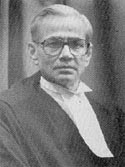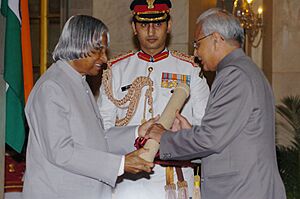V. N. Khare facts for kids
Quick facts for kids
Vishweshwar Nath Khare
Hon'ble Chief Justice of India (Retd.)
|
|
|---|---|
 |
|
| Chancellor of the Central University of Jharkhand | |
| In office August 2017 – December 2023 |
|
| Appointed by | Ram Nath Kovind |
| 33rd Chief Justice of India | |
| In office 19 December 2002 – 01 May 2004 |
|
| Appointed by | A. P. J. Kalam |
| Preceded by | Gopal Ballav Pattanaik |
| Succeeded by | S. Rajendra Babu |
| Judge of Supreme Court of India | |
| In office 21 March 1997 – 18 December 2002 |
|
| Nominated by | A. M. Ahmadi |
| Appointed by | Shankar Dayal Sharma |
| 29th Chief Justice of Calcutta High Court | |
| In office 2 February 1996 – 20 March 1997 |
|
| Nominated by | A. M. Ahmadi |
| Appointed by | Shankar Dayal Sharma |
| Preceded by | Krishna Chandra Agarwal |
| Succeeded by | Prabha Shankar Mishra |
| Judge of Allahabad High Court | |
| In office 25 June 1983 – 1 February 1996 |
|
| Nominated by | Y. V. Chandrachud |
| Appointed by | Zail Singh |
| Personal details | |
| Born | 2 May 1939 Allahabad, Uttar Pradesh, India |
| Citizenship | India |
| Children | 2 |
| Residence | Allahabad |
| Alma mater | Allahabad University |
Vishweshwar Nath Khare is a respected Indian judge who has retired from his work. He held a very important position as the 33rd Chief Justice of India. He served in this role from December 19, 2002, until May 1, 2004.
Before becoming the Chief Justice, he was a Judge in the Supreme Court of India. He also served as the Chancellor of the Central University of Jharkhand. This role is like being the head of a university. He held this position from 2017 to 2023.
Contents
Early Life and Education
Vishweshwar Nath Khare was born on May 2, 1939. His birthplace was Allahabad in India. He belonged to a Kayastha family.
He went to St. Joseph's College, Allahabad for his early studies. Later, he continued his education at Allahabad University. Besides his studies, Khare was also a talented cricket player. He played for the state of Uttar Pradesh in Ranji Trophy matches in 1958.
A Career in Law
Khare began his legal journey as an advocate in 1961. He worked at the Allahabad High Court. There, he handled different types of legal cases. These included cases related to civil law, special legal orders (writs), and tax matters.
He was chosen to be the Chief Standing Counsel for the Government of Uttar Pradesh. This meant he was a main lawyer for the state government. On June 25, 1983, he became a Judge of the Allahabad High Court. In early 1996, he was appointed Chief Justice of the Calcutta High Court. Just a year later, he moved to the Supreme Court of India. During his time in the Supreme Court, Justice Khare wrote 223 judgments.
A Big Case: The Emergency
In 1975, when Khare was an advocate, he worked on a very important case. He and his uncle, S. C. Khare, represented Indira Gandhi. She was the Prime Minister of India at the time. The case was against Raj Narain, who claimed there were problems with her election.
Khare helped get a temporary hold on a High Court order. This allowed time for an appeal to be filed in the Supreme Court. The Supreme Court's decision in this case led to a period called the Emergency in India. This was a time when democracy was suspended for 19 months. It was the only time this has happened in India since it became independent in 1947.
Helping Justice After Difficult Times
When Justice Khare was the Chief Justice of India, he faced a big challenge. This was related to the justice system after the events in Gujarat in 2002. He made a key decision to reopen a case known as the Best Bakery case. This decision helped victims get a chance for justice.
When he retired, he spoke to The Hindu newspaper. He said he found that there was a "complete agreement" between the accused and the lawyers for the government in Gujarat. He felt this was not fair. He said the Supreme Court had to step in. This was to make sure victims and witnesses were protected. He was sad about what happened during the trials. But he was determined to fix the justice system.
In interviews in 2004, Khare explained why he moved the Best Bakery case. He sent it to Maharashtra for a new trial. In 2012, he shared more details about the Best Bakery case. He also spoke about the Gulbarg Society massacre. He explained why he believed the events in Gujarat in 2002 were a serious failure of the state to protect its people.
After Retirement
After retiring as Chief Justice of India, Khare sometimes shares his thoughts. He appears on national television and in newspapers. He talks about legal issues and how justice works.
His comments on the Jessica Lal murder case were similar to his feelings about the Gujarat events. He was also appointed the Chancellor of Central University of Jharkhand in 2017. He served in this role until the end of 2023.
Awards and Recognition
In 2006, Justice Khare received a very high honor. He was awarded the Padma Vibhushan. This is India's second highest award given to civilians.


